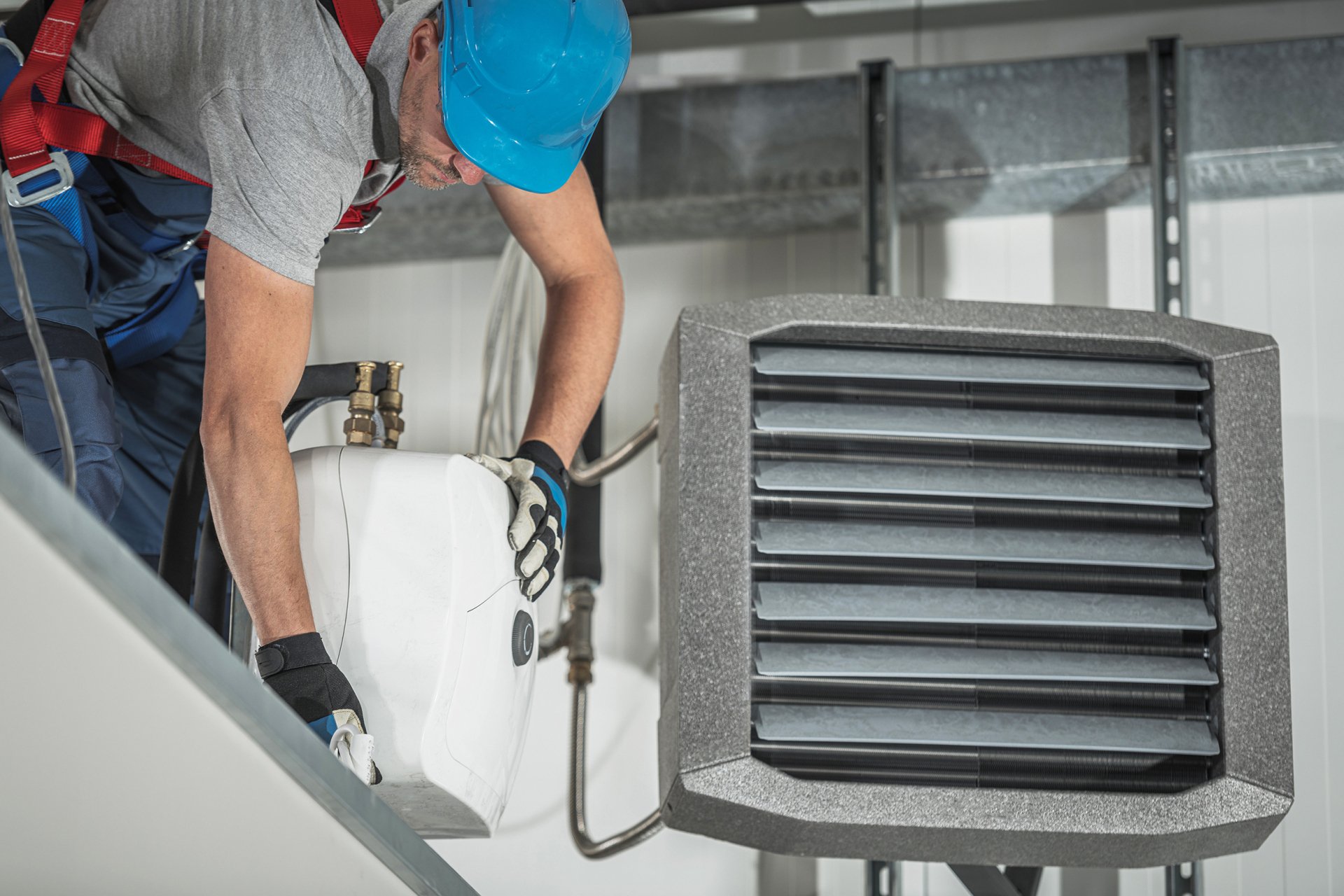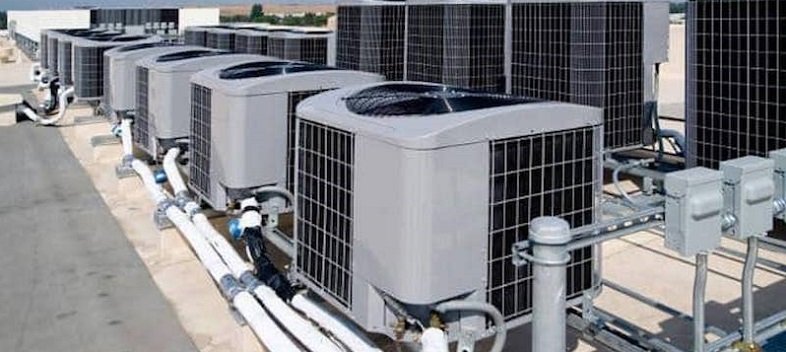Choosing Between a Heatpump and Heater: Key Factors To Consider for Your HVAC Demands
When assessing heating alternatives for a/c needs, the choice between a heatpump and a heater can be complicated. Each system provides unique benefits customized to certain climates and power effectiveness goals. Understanding these differences is crucial for making an informed choice. Secret factors such as installment expenses and environmental effect even more make complex the choice procedure. Which choice absolutely lines up with one's comfort and sustainability choices? The complying with sections will certainly discover these factors to consider thoroughly.
Understanding Warmth Pumps: Exactly How They Work and Their Advantages
While many home owners consider numerous heating choices, understanding exactly how heatpump function and their advantages can substantially affect their choice. Warmth pumps run by transferring heat instead of creating it. In the winter season, they extract warm from the outdoors air or ground and move it indoors, while in the summer, they reverse this procedure, cooling the home by removing warmth outside. This dual performance makes them functional for year-round environment control.One of the primary advantages of heatpump is their energy performance. They make use of significantly less electricity compared to standard heater, potentially leading to reduced energy bills (heat pump service). Additionally, heatpump have a smaller carbon impact, making them an environmentally friendly choice. They also require much less upkeep than traditional systems, adding to lasting price financial savings. In general, recognizing the auto mechanics and benefits of heatpump can assist homeowners make informed decisions regarding their heating and cooling needs
Checking Out Heating Systems: Kinds, Procedure, and Advantages
Heating systems come in different types, including gas, electrical, and oil designs, each with distinct operational devices. Recognizing these differences is essential, as they affect effectiveness and home heating performance. Additionally, heating systems offer numerous benefits, such as consistent warm output and dependability in cooler climates.
Sorts of Heaters
Heating unit can vary significantly in style and operation, with heaters being a prominent choice amongst home owners. There are a number of kinds of heating systems, each making use of different gas sources and innovations. Gas furnaces prevail, leveraging gas to produce heat efficiently. Electric furnaces, on the other hand, utilize electric resistance to produce warmth, commonly favored for their straightforward setup. Oil heating systems, while much less common, work in areas with restricted gas gain access to (ductless mini splits). Furthermore, condensing furnaces take full advantage of energy effectiveness by capturing and recycling exhaust gases. Each type runs through a system of warmth exchangers and ductwork to distribute warm air throughout a home. Understanding the differences between these furnace types is vital for informed heating and cooling decisions
Advantages of Heaters
For property owners looking for reputable warmth during cool months, the benefits of furnaces are substantial. Heaters offer regular home heating, guaranteeing even temperature levels throughout the home. They are particularly effective in severe cold, commonly outmatching heat pumps in freezing conditions. Different types, consisting of gas, electrical, and oil heaters, supply adaptability to satisfy diverse demands and preferences.Furnaces additionally often tend to have lower first setup costs contrasted to heat pumps, making them a more easily accessible alternative for several. Their durable design adds to a longer life expectancy, with several systems lasting over 15 years with appropriate upkeep. Furthermore, contemporary heating systems are often geared up with sophisticated innovation for improved effectiveness, which can cause minimized energy costs. In general, heating systems continue to be a reputable choice for efficient home heating.

Energy Effectiveness: Comparing Heat Pumps and Furnaces
When contrasting power performance between warmth pumps and heating systems, the Seasonal Power Efficiency Ratio (SEER) plays a necessary function in identifying efficiency. Furthermore, an operational cost analysis discloses the long-term monetary implications of each system. Comprehending these elements can guide house owners in making informed decisions regarding their heating remedies.
Seasonal Energy Effectiveness Proportion
Energy efficiency plays an important role in the decision-making procedure in between heatpump and furnaces, particularly when thinking about the Seasonal Energy Performance Proportion (SEER) This metric procedures the cooling performance of heatpump over a whole cooling period, supplying a standardized means to assess performance. Higher SEER ratings show greater energy efficiency, equating to lower power usage and reduced utility costs. On the other hand, heaters are usually assessed using the Yearly Gas Utilization Performance (AFUE) score, which shows heating effectiveness. When contrasting these 2 systems, property owners need to focus on SEER ratings for heatpump, as they straight effect total power cost savings and environmental sustainability. A thorough understanding of SEER can significantly influence the lasting fulfillment and cost-effectiveness of the chosen cooling and heating solution.
Operational Expense Analysis
Comprehending the functional prices connected with heat pumps and heaters is vital for property owners examining their choices. Heat pumps commonly use greater energy performance, transforming electric power into warmth with marginal waste. This leads to reduced regular monthly energy expenses, specifically in moderate environments. Alternatively, conventional heaters, especially gas models, may have lower in advance costs yet can incur higher functional costs in time because of sustain prices and effectiveness ratings.Moreover, heat pumps can work Full Article as both home heating and cooling systems, possibly reducing the requirement for different cooling and heating systems. While first financial investments for warm pumps might be greater, their long-lasting savings in power efficiency can make them an extra cost-efficient choice for numerous families. Mindful analysis of regional energy prices is vital to determine the most effective choice.
Installation Expenses: What to Anticipate for each and every Furnace
Installment costs for furnace can vary significantly between heatpump and furnaces, influencing home owners' decisions. Heatpump typically have higher in advance setup expenses, normally varying from $3,500 to $8,000, depending upon the device dimension and intricacy of setup. This consists of the outside system, indoor handling system, and essential ductwork modifications. Conversely, furnaces tend to have reduced initial expenses, balancing between $2,500 and $6,000, which can be appealing for budget-conscious house owners. Setup expenses can boost if substantial ductwork is required.Moreover, the option of fuel kind for heaters-- all-natural gas, propane, or electrical-- can likewise affect installation prices. While warmth pumps supply power efficiency, their first financial investment might discourage some customers. Eventually, examining installation prices alongside long-term financial savings and effectiveness will certainly help home owners in making educated decisions concerning their home heating systems.
Environment Considerations: Which System Does Better in Your Location
Just how do environment problems influence the effectiveness of furnace? The performance of heatpump and heaters can vary greatly depending on the regional environment. In moderate climates, warm pumps excel by effectively moving warmth from the outdoors air, making them an energy-saving choice. However, their efficiency decreases in very cool temperature levels, where they might struggle to extract adequate warmth. Alternatively, furnaces, especially gas versions, supply trustworthy and regular warm no matter exterior problems, making them more suitable in cooler regions.In locations that experience milder winter seasons, heatpump can run successfully year-round, supplying both cooling and heating. On the other hand, regions with extreme winter seasons usually take advantage of the robustness of heating systems. Inevitably, understanding the regional climate is crucial when making a decision between a heat pump and a furnace, as it directly influences their go to this site functional efficiency and total efficiency.
Upkeep Requirements: Long-Term Look After Heat Pumps vs. Furnaces
While both heatpump and heating systems require routine maintenance to ensure peak performance, their particular demands and care regimens differ substantially. Heating systems usually require much less constant interest, with yearly assessments being sufficient to look for gas leakages, tidy filters, and assess overall capability. Their easier style frequently permits for uncomplicated repairs.In contrast, heatpump require semiannual upkeep because of their double function in cooling and heating. This consists of cleaning coils, checking cooling agent degrees, and ensuring that both the outside and indoor devices operate at their best. In addition, warmth pump maintenance typically involves even more elaborate parts, making expert maintenance essential.Neglecting maintenance can bring about diminished effectiveness and enhanced energy prices for both systems. Inevitably, home owners should think about these long-term treatment requirements when selecting in between a heatpump and a heater, as aggressive maintenance can expand the life-span and performance of either system significantly.
Environmental Effect: Selecting a Sustainable Heating Choice
The environmental effect of heating unit is an important assessment for homeowners seeking sustainable options. Heatpump are normally more energy-efficient than typical heating systems, as they transfer warm rather than generate it, considerably decreasing carbon discharges. By utilizing renewable resource sources, such as geothermal or air-source warm pumps, property owners can additionally reduce their ecological footprint.On the other hand, natural gas heating systems emit greenhouse gases and add to air contamination, though they often offer higher warmth result. Nonetheless, innovations in modern technology have actually led to the advancement of high-efficiency heating systems that minimize emissions.Ultimately, picking a home heating system entails evaluating effectiveness versus environmental effect. Homeowners are encouraged to review neighborhood power sources and rewards for sustainable systems, guaranteeing a choice that straightens with both personal convenience and environmental responsibility. The choice impacts not just immediate convenience but additionally long-lasting sustainability and ecological health.
Regularly Asked Questions
The Length Of Time Do Warmth Pumps and Furnaces Normally Last?
The life-span of heatpump typically ranges from 15 to twenty years, while heating systems can last in between 15 to 30 years. Routine upkeep considerably influences their durability and performance in supplying home heating remedies.
Can I Utilize a Warmth Pump in Incredibly Cold Climates?
Warm pumps can run in extremely chilly climates, however their performance reduces as temperature levels drop. In such conditions, additional home heating resources may be necessary to preserve comfortable interior temperatures and assure peak efficiency.

What Is the Noise Degree of Heat Pumps Versus Furnaces?
The noise degrees of heatpump and furnaces differ substantially. Normally, heatpump run even more quietly than typical heaters, making them more effective for those conscious appear, while furnaces might create louder operational noises throughout heating cycles.
Are Heat Pumps Suitable for Both Home Heating and Air conditioning?
Heat pumps are without a doubt appropriate for both heating & cooling (heat pump replacement ooltewah tn). They function by transferring warm, offering reliable temperature control year-round, making them a functional choice for homeowners seeking an all-in-one HVAC option
What Size Home Heating System Do I Need for My Home?
Identifying the appropriate size heating unit for a home needs examining variables such as square video, insulation top quality, regional climate, and the home's layout. Consulting a professional can guarantee a precise assessment and suitable comfort. Warmth pumps usually supply higher energy effectiveness, transforming electric energy into warmth with minimal waste. In moderate climates, heat pumps succeed by efficiently transferring warm from the outdoors air, making them an energy-saving alternative. Conversely, heating systems, specifically gas designs, provide constant and trusted heat regardless of exterior conditions, making them more suitable in chillier regions.In areas that experience milder wintertimes, warm pumps can operate successfully year-round, offering both home heating and air conditioning. Warmth pumps are usually more energy-efficient than standard furnaces, as they transfer warmth instead than create it, significantly decreasing carbon discharges. By using sustainable power resources, such as air-source or geothermal warm pumps, homeowners can additionally decrease their see this site environmental footprint.On the other hand, natural gas furnaces give off greenhouse gases and contribute to air pollution, though they usually give greater warm outcome.